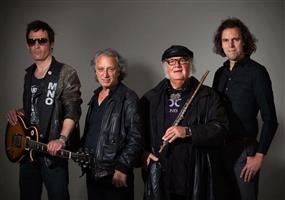* Page Loading - Please Wait *
Sorry, This Event is in the past!
Focus
Genre : Music - General
With their unique brand of progressive rock, Focus manifested themselves at the start of the '70s as the most successful and appreciated of all the Dutch pop-rock exports. Fronted by founding member Thijs Van Leer, and best known for their hits ?Hocus Pocus?, ?House of The King? and ?Sylvia?, as well as critically acclaimed albums 'Moving Waves', 'Focus 3' and 'Hamburger Concerto', the iconic Dutch music masters are back with their tenth album, which is guaranteed to please their legions of fans!
After a comeback in the early 2000's, which resulted in the well-received albums 'Focus 8' and 'Focus 9', the band regrouped with a fantastic new line-up. Along with Thijs van Leer on vocals, flute and keyboards, back on the drums is famed Focus drummer Pierre van der Linden, who joined the group on their second album 'Moving Waves' in 1972. Internationally renowned for his rhythmic skills, Pierre remains a defining factor in the Focus sound. Guitarist Menno Gootjes, who participated in Focus at an earlier stage, and acclaimed bass player Udo Pannekeet, complete the band's current line-up. Recently, Focus's biggest hit "Hocus Pocus" was used in a 4-minute Nike commercial before the World Cup broadcast. Focus music can be regularly heard on Top Gear and Saxondale on TV in the UK.
A new Focus era has arrived! There is a rejuvenated passion amongst the band as it enters the studio to record Focus 11 and prepares to go out on the road again for a World Tour, in support of the new album, and as it builds up to its 50th Anniversary.
Thijs van Leer - Hammond-organ, flute and vocals
Pierre van der Linden - drums
Menno Gootjes- guitar
Udo Pannekeet - bass
Focus, Sylvia click on link: https://youtu.be/UVB7FgO4Jek
This show is Unreserved Seating.
For any enquiries or disabled bookings - please call OEP Live! on 01256 416384

Westgate Hall has been a dynamic community space within Canterbury’s city walls for a century. It is now opening its doors refurbished and refreshed ready for another 100 years of service.
Westgate Hall was built by public subscription as a drill hall for the Territorial Army in about 1913. It lies in the heart of Canterbury, just off the high street, and opens onto the Pound Lane car park.
Over the decades it has adapted to the needs and pressures of the time. Troops marched from the Hall to the battlefields of World War One. It survived the bombings of 1944. Then, from serving as a drill hall, it evolved into a venue for conferences, dancing, fairs, blood giving, vote counting, emergencies and community celebrations. It’s unsurprising then that it’s a focal point of community memories.
However in February 2010 the Hall’s future was in doubt as it needed substantial refurbishment. In the midst of the recession, faced by the need to make budget cuts, the high cost of repairs and running the building persuaded Canterbury City Council to vote to demolish it. With the Hall gone the space could be used for parking, revenue from the Pound Lane car park would increase, and ultimately the land could be sold for redevelopment.
The Trust is a company limited by guarantee with charitable status. Its vision for Westgate Hall and its role in Canterbury is defined by the charity’s Articles of Association and the terms of its 99-year lease to the building.
Its purpose is to preserve, maintain and manage Westgate Hall as a financially self-sustaining community and leisure centre for the benefit of the people of Canterbury and its districts.
The diverse group of local people who make up the Trust aims to maintain and enhance the quality of community life by working together with residents, users of the Hall, the local authorities, public, private and voluntary sector organisations to provide facilities supporting education, social welfare, recreation and leisure activities.
With community its anchor, the Trust is non political and does not discriminate.
A community group, the Westgate Community Trust (Canterbury), was constituted immediately following that decision. The Trust’s founding members had met on the Save the Westgate Hall, Canterbury Facebook page in the weeks preceding the vote. It had been a forum for Canterbury’s community to express its frustration with the Council’s proposal. Emotions had run high with discussions between residents and the Council frequently acrimonious. Residents resented potentially losing part of the city’s military heritage as well as a unique non-denominational community space which had touched so many lives over the century. Weaving its way through the conversations and debates was the residents’ feeling that their views about the future development of their city and its impact on their lives were again being ignored. It appeared Council consultations with the community were only form-ticking with the interests of developers, businesses, universities and tourists having priority.
Trust members believed the Hall should be saved given its history, its role in Canterbury’s community life and the one it could play in the future as the city adapted to the urban needs of the 21st century. Doubts about whether a change in the Council’s position was possible given the vote, and apprehension about how it would react to the Trust’s vision given the atmosphere of the preceding weeks, disappeared at a meeting with the Council officers responsible for the building. The vote was not yet final. The officers encouraged the Trust to produce a business plan making its case. We had three weeks.
By focusing on saving the Hall for the community and being non political, the Trust’s plan persuaded Councillors to continue funding the building until summer 2011. The Council’s challenge to the Trust: a second business plan should prove the Hall would be financially self-sustaining and need no further investment from the Council were it to grant the Trust a lease.
The Trust was able to make the emotional case for saving the building. Months of consultation with Canterbury’s community (residents and representatives of the public, private and voluntary sectors), events at the Hall, both large-scale community celebrations (the Big Lunch, Bring and Fix, Curry & Quiz, Christmas Fair) and those organised with the support of local businesses, raised the Trust’s profile, increasing awareness of and support for its efforts in the city.
However having no financial track record or asset the Trust couldn’t apply for grants or loans, and without being able to raise finance the Trust knew it would be unsuccessful in saving the Hall. During this period Corinthian Curzon/Curzon Cinemas approached the Trust as it was interested in the Hall being the site of its first cinema outside London. Against an upfront capital payment to refurbish the drill hall side of the Westgate Hall complex, the Trust agreed it would sub-let the two-storey conference side to Curzon Cinemas for conversion into a three-screen art house cinema.
Thanks to huge community generosity and engagement, the Council officers who were unfailingly supportive in guiding the Trust through the process of developing its business plans so that they met Council requirements, and its corporate partnership with Curzon Cinemas, the Trust was able to meet the Council’s challenge.
On 27th July, 2011, convinced by its proposal to transform the Westgate Hall into Canterbury’s ‘village hall’ and that its financial criteria were met, the Council Executive awarded the Trust a 99-year lease. It was signed with the Trust in February 2014.
Westgate Hall Road,
Canterbury,
Kent,
England,
CT1 2BT.
01227 634886
Sorry, This Event is in the past!
Whilst every effort goes into ensuring this event listing is accurate and up to date, always check with the venue before you travel.




